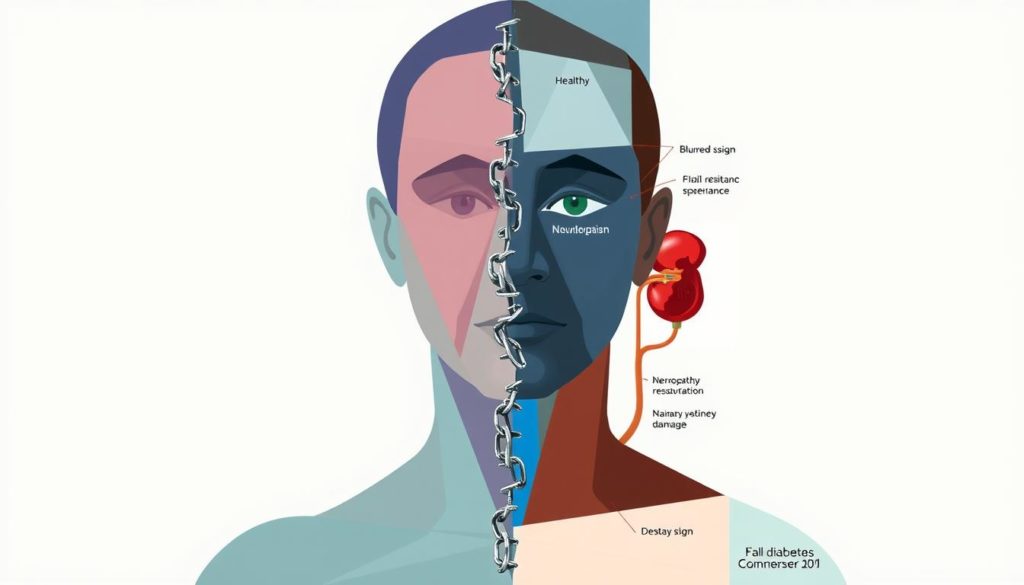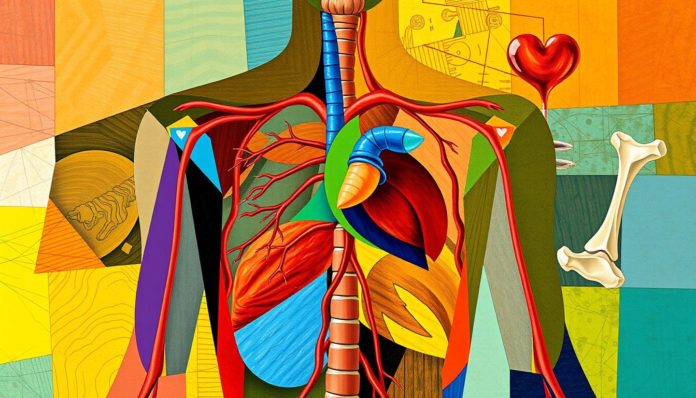Did you know over 34 million Americans, or nearly 10% of us, have diabetes? This large number shows us why it’s critical to understand diabetes and its effects. It’s more than just blood sugar levels – it can seriously harm many organs and systems.
Diabetes can cause problems from heart issues to nerve damage. We’ll look at how diabetes affects the body, from light symptoms to big complications.
It’s important to know these problems to create good health plans. We are here to guide you on the effects of diabetes. Learning and early detection are key in fighting this widespread issue.
Overview of Diabetes and Its Types
Diabetes is a health condition where blood sugar levels are too high due to poor insulin use or production. It comes in different forms, each needing its own care plan. Knowing its diabetes physical impact is key for good health.

Type 1 Diabetes
Type 1 Diabetes happens when the body’s immune system attacks cells that make insulin in the pancreas. It is usually found in kids and young people. People with Type 1 Diabetes need insulin all their lives because their pancreas can’t make it.
Type 2 Diabetes
Type 2 Diabetes is the kind you hear about most often. It’s linked to genes and lifestyle, like being active and eating well. It used to be in adults over 45 but now younger people get it too, because more people are overweight. Managing it involves healthy living, medicines, and sometimes insulin.
Gestational Diabetes
Gestational Diabetes develops during pregnancy. It can be risky for mom and baby but usually goes away after the baby is born. Keeping blood sugar stable with diet and exercise is crucial for a safe pregnancy. It also lowers the diabetes physical impact on both.
Prediabetes
Prediabetes means blood sugar is high but not high enough to be Type 2 Diabetes. Changing your lifestyle by eating better and moving more can stop diabetes before it starts. It’s all about avoiding the health problems that come with diabetes.
Diabetes Symptoms and Early Signs
It’s very important to know the early signs of diabetes for prompt diagnosis and treatment. This applies to Type 1, Type 2, or gestational diabetes. Knowing the specific symptoms can drastically improve your health.
Common Symptoms of Type 1 Diabetes
Type 1 diabetes usually starts suddenly. It has several noticeable symptoms, such as:
- Increased thirst and frequent urination
- Unintended weight loss
- Extreme hunger
- Fatigue and weakness
- Blurred vision
Common Symptoms of Type 2 Diabetes
Type 2 diabetes symptoms tend to develop slowly. Because of this, they might be hard to spot. Common ones include:
- Increased hunger and thirst
- Frequent urination
- Slow-healing sores
- Fatigue
- Areas of darkened skin
Gestational Diabetes Symptoms
Gestational diabetes often shows no clear symptoms. That’s why pregnant women should get screened. However, some early signs might be:
- Increased thirst
- Fatigue
- Frequent urination
Being aware of diabetes symptoms can help in early detection and management. Don’t ignore early signs of diabetes. They show how it affects the body.
Effective management of diabetes can help avoid severe complications. It also improves life quality.

Diabetes Impact on Body
Diabetes affects many body systems, leading to serious health problems. It not only affects major organs but also causes diabetes complications. These complications can greatly change one’s life for the worse.
High blood sugar can harm blood vessels and nerves. This damage leads to heart disease, stroke, and kidney issues, among other problems. Knowing about these effects helps in managing diabetes better.
We will explore these specific diabetes complications:
- Cardiovascular disease, which increases the risk of heart attacks and strokes.
- Neurological problems, like peripheral and autonomic neuropathy.
- Kidney damage, possibly leading to chronic kidney disease.
- Eye issues, including diabetic retinopathy, glaucoma, and cataracts.
- Skin problems, an often ignored result of diabetes.
- Mental health problems, especially depression and anxiety.
The impact of diabetes on the body is broad. It needs detailed care and prevention efforts to reduce these risks.
Cardiovascular Complications Due to Diabetes
Diabetes raises the risk for heart-related problems. It harms blood vessels and makes artery walls thick. These issues can lead to serious problems like heart attacks and strokes. Knowing how diabetes affects the heart is key to taking care of these risks.
Heart Disease Risk
Diabetes and heart disease are closely tied. Over time, high sugar levels hurt blood vessels and nerves that control the heart. This leads to atherosclerosis, where fatty deposits build up in arteries. So, people with diabetes face a higher chance of having heart attacks and other heart problems.
Stroke Risk
Diabetes also ups the risk of having a stroke. High sugar in the blood can block or harm vessels that bring blood to the brain. This can cause ischemic strokes, where the brain doesn’t get enough blood. That’s why controlling blood sugar, blood pressure, and cholesterol is crucial to lower stroke risk.
| Complication | Impact |
|---|---|
| Heart Disease | Increased risk due to damage to blood vessels and atherosclerosis. |
| Stroke | Elevated risk from poor blood flow to the brain due to blocked blood vessels. |
Impact of Diabetes on Nerves
High blood sugar from diabetes can harm nerves, causing diabetic neuropathy. This condition affects different parts of the nervous system. People may experience forms like peripheral neuropathy and autonomic neuropathy, each with its own challenges and symptoms.
Peripheral Neuropathy
Peripheral neuropathy impacts the nerves in the feet and hands, outside the brain and spinal cord. Symptoms include numbness, tingling, and pain. High blood sugar over time worsens these symptoms, leading to potential disability.
Autonomic Neuropathy
Autonomic neuropathy targets the system controlling involuntary functions like heart rate and digestion. High blood sugar can cause symptoms such as stomach issues, lightheadedness, and bladder problems. Knowing how diabetes affects nerves helps manage diabetic neuropathy risks.
Kidney Damage from Diabetes
Diabetes can greatly harm the kidneys. This leads to complications that may harm your health. Keeping blood glucose levels in check is key to avoid kidney damage.
Diabetic Nephropathy Explained
Diabetic nephropathy is kidney damage due to high blood sugar. This damage makes it hard for kidneys to filter waste and fluids. Spotting this condition early is vital for slowing its progress.
Chronic Kidney Disease
Chronic kidney disease (CKD) comes from long-term kidney damage due to diabetes. It’s a key cause of CKD, which may lead to kidney failure if ignored. Regular tests and keeping both blood pressure and sugar levels healthy are crucial. They help in preventing or delaying CKD for diabetics.
Effects of Diabetes on Eyesight
Diabetes affects millions and can harm many body parts, including the eyes. Knowing how diabetes impacts eyes is key to prevent and deal with vision issues.
Diabetic Retinopathy
Diabetic retinopathy is a major eye issue caused by diabetes. High sugar levels damage retina blood vessels. This can lead to vision loss or blindness if not treated early. Regular eye checks are vital for diabetics to find and treat diabetic retinopathy quickly.
Glaucoma and Cataracts
Glaucoma and cataracts are more common in diabetics. Glaucoma harms the optic nerve, often because of high eye pressure. If not managed, it can cause permanent vision loss. Cataracts make the eye’s lens cloudy and worsen faster in diabetics. These conditions show why regular eye care is crucial for diabetes patients.
- High sugar levels harm retina blood vessels, causing diabetic retinopathy.
- Diabetics face a higher risk of glaucoma and cataracts.
- Regular eye exams are vital for early detection and management.
- Managing blood sugar, pressure, and cholesterol is key to handling diabetic eye disease.
| Condition | Description | Risk Factors | Treatment |
|---|---|---|---|
| Diabetic Retinopathy | Damage to retina’s blood vessels | High blood sugar, blood pressure, cholesterol | Anti-VEGF medications, laser treatments, surgery |
| Glaucoma | Damage to optic nerve from high eye pressure | Diabetes, prolonged duration of diabetes | Eye drops, medications, surgery |
| Cataracts | Clouding of the eye’s lens | Diabetes, aging | Surgery to replace cloudy lens with clear artificial lens |
Diabetes and Skin Conditions
People with diabetes often deal with unique skin issues because of their condition. High blood sugar can cause different skin problems. It’s very important to watch your skin health closely.
One common skin condition due to diabetes is bacterial infections. They can make tissues inflamed, usually from Staphylococcus bacteria. This leads to itching and discomfort.
Fungal infections are also frequent for those with diabetes. The main cause is Candida albicans, leading to athlete’s foot, jock itch, and ringworm. These fungi may cause sores, rashes, and patches that are whitish or reddish.
Itchy skin, or pruritus, often comes from dry skin or poor circulation. Both are usual in people with diabetes. Even if it seems small, ongoing itching can become serious if not treated.
To help readers understand better, here’s an overview:
| Skin Condition | Cause | Symptoms |
|---|---|---|
| Bacterial Infections | Staphylococcus Bacteria | Inflammation, redness, warmth |
| Fungal Infections | Candida albicans | Sores, rashes, patchy skin |
| Itchy Skin (Pruritus) | Dry Skin, Poor Circulation | Persistent itching |
Finally, it’s vital to manage diabetes skin problems for your overall health. Stay alert, get medical help for infections quickly, and keep up with good skin care. This can help those with diabetes lower their risk of severe skin conditions due to diabetes.
Mental Health and Diabetes
Handling diabetes is not just about blood sugar. It’s also key to look after your mental health. The link between mental health and diabetes is vital, affecting your overall health. People with diabetes often face more depression and anxiety. This leads to what’s known as diabetes distress.
Diabetes and Depression
Depression is common and serious in those with diabetes. It makes sense since long-term illnesses can bring sadness, hopelessness, and tiredness. Having to constantly check blood glucose, follow diet limits, and worry about complications can become too much. This can result in depression. Those dealing with both diabetes and depression need to get help from healthcare experts. These professionals can offer treatments and counseling.
Anxiety and Diabetes
Anxiety makes managing diabetes even harder. Worrying about low blood sugar events can lead to constant stress. This stress affects how well you live your life. Added to the daily tasks of managing diabetes, anxiety can feel overwhelming. Getting professional help and learning to cope can make things better. It helps improve well-being and lets people take charge of their diabetes care.
FAQ
What is diabetes, and how does it impact the body?
Diabetes is a long-lasting health issue. It results in high blood sugar. This can harm many body parts, like the heart, nerves, and kidneys.
Problems from diabetes include heart disease, nerve damage, and vision loss. These problems can affect how well you live.
What are the different types of diabetes?
Diabetes comes in various forms, such as Type 1, Type 2, and Gestational. Each type has its own causes and ways to manage it.
Type 1 is an immune system condition. Type 2 links to how you live. Gestational diabetes happens during pregnancy. Prediabetes means sugar is high but not diabetes high yet.
What are common symptoms of diabetes?
Signs of diabetes include feeling very thirsty, peeing a lot, losing weight without trying, feeling tired, seeing blurry, and having lots of ketones in your pee.
Depending on the diabetes type, symptoms can differ. It’s critical to pay attention to them.
How does diabetes affect cardiovascular health?
Diabetes raises risks of heart-related diseases. These include heart attacks and strokes.
High sugar damages blood vessels. This leads to atherosclerosis, where arteries get narrow and hard. This makes blood flow tough.
What is diabetic neuropathy, and how does it impact the body?
Diabetic neuropathy is nerve damage from high sugar. It can lead to numbness and pain, often in feet and hands.
It can also affect heart rate and digestion. Such damage makes day-to-day life hard.
How does diabetes affect kidney health?
Diabetes can hurt the kidneys. This is called diabetic nephropathy.
It may cause chronic kidney disease or even kidney failure. Some people might need dialysis or a kidney transplant.
What eye problems are associated with diabetes?
Diabetes can cause eye issues like diabetic retinopathy, glaucoma, and cataracts. Diabetic retinopathy damages retina blood vessels. It can cause blindness if not treated.
People with diabetes are more likely to get glaucoma and cataracts. Both can affect your vision.
Are there skin conditions linked to diabetes?
Yes, diabetes can lead to skin problems. It affects the body’s healing and fighting infection.
Issues include bacterial and fungal infections and diabetic dermopathy. Diabetic dermopathy causes light brown, scaly patches. Good skin care is key for people with diabetes.
How does diabetes impact mental health?
Diabetes can be tough on mental health. It can make people feel depressed or anxious.
Dealing with a chronic condition is challenging. It’s key to get emotional support along with medical care.


